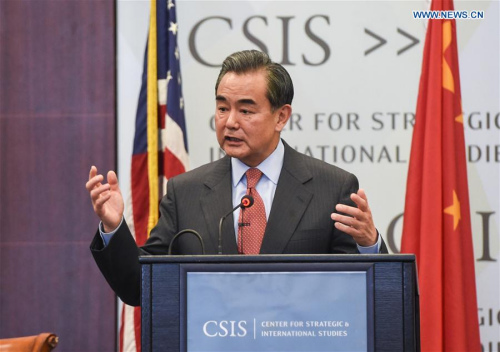
Chinese Foreign Minister Wang Yi speaks during a discussion on Chinese foreign policy and China-U.S. Relations at Center for Strategic and International Studies(CSIS) in Washington D.C., the United States, on Feb. 25, 2016. (Photo: Xinhua/Bao Dandan)
Chinese Foreign Minister Wang Yi concluded a crucial visit to the United States Thursday, with a strong call for maintaining steady development of the China-U.S. relationship with vision and wisdom.
Wang's visit, which came amid escalating tensions on the Korean Peninsula and a strain in the China-U.S. relationship over the South China Sea issue, was mainly focused on the China-U.S. communication and coordination on issues of mutual concern and preventing the bilateral ties from drifting off the track.
It is a timely visit in light of the recent nuclear test and satellite launch by the Democratic People's Republic of Korea (DPRK), which have threatened the stability in East Asia by pushing the Korean Peninsula to the edge of armed confrontation.
In a packed schedule, Wang held a series of meetings with U.S. President Barack Obama, Secretary of State John Kerry, National Security Advisor Susan Rice and Congressional leaders on foreign policy, for extensive and in-depth discussions on a wide range of pressing issues.
Both sides reviewed and commended the tangible achievements in their past cooperation on issues such as bilateral economic and trade ties, climate change, Iranian nuclear talks, Afghanistan, and Syrian peace talks.
They also agreed on the need to impose further sanctions on the DPRK, which are being negotiated within the framework of the United Nations Security Council. The Council is expected to pass a resolution on the DPRK sooner as a result.
China expressed its support to and promised to make positive contribution to the upcoming nuclear security summit to be hosted by Obama at the end of March, while the U.S. pledged to support China in hosting the G20 summit in September. The two summits will serve the venue for Obama and Chinese President Xi Jinping to meet and discuss ways to narrow differences and deepen mutual cooperation.
Though both sides still differed on the issue of the South China Sea, they did agree on the need to settle the maritime disputes there through dialogue and diplomacy.
This visit, hopefully, will help reduce the tensions and increase mutual understanding to prevent miscalculation and misjudgment, especially on the South China Sea issue.
All in all, as Wang put it, South China Sea is not and should not be an issue between China and the U.S., which is not a claimant. As China will not budge on its core interests, Washington needs to learn to respect China by genuinely taking into consideration its needs and interests.
It will be naive to presume that the China-U.S. relationship, as consequential, diverse and complicated as it is, will be free of differences and conflicts. This is just the premise for China's strong support for the construction of a new model of major-country relationship with the U.S., featuring no confrontation, no conflict, mutual respect and win-win cooperation.
The key for China and the U.S. to avoid the so-called Thucydides Trap of confrontational great-power rivalry seen in the past history lies in the expansion of areas of cooperation and proper management of their disputes in a constructive way.
In this sense, the U.S. has to do a lot of soul searching on the South China Sea issue, which Washington uses as a tool to contain China due to its chronic paranoia that China's rise will threaten its hegemony in the Asia-Pacific.
In a speech to the U.S. think tank Center for Strategic and International Studies Thursday, Wang proposed that Washington should deal with the China-U.S. ties with vision and wisdom.
The top Chinese diplomat euphemized that that people "should use a telescope to look far into the future of the China-U.S. relationship, instead of using a microscope to magnify the current problems."
As Wang emphasized, China has no intention to challenge the U.S. as it is now bent on seeking to realize the dream of national revitalization through economic development.
For the sake of developing a stable and healthy China-U.S. relationship that not only benefits both peoples but also the world at large, Washington really has to lend an ear to China in this regard.


















































